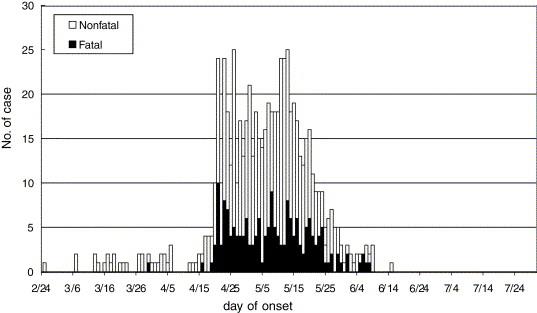SARS in Taiwan: an overview and lessons learned. |
| |
| Authors: | Kow-Tong Chen Shiing-Jer Twu Hsiao-Ling Chang Yi-Chun Wu Chu-Tzu Chen Ting-Hsiang Lin Sonja J Olsen Scott F Dowell Ih-Jen Su |
| |
| Affiliation: | Field Epidemiology Training Program, Department of Health, Center for Diseases Control, Taiwan. ktchen@health.gov.tw |
| |
| Abstract: | 
OBJECTIVES: This report aims to describe the epidemiology of severe acute respiratory syndrome (SARS) in Taiwan between March and July 2003, and to examine the public health response. METHODS: Surveillance for SARS was initiated on 14 March 2003. Response activities are described for the isolation of patients; contact tracing; quarantine of contact persons; fever screening for inbound and outbound passengers at the airport; and hospital infection control as assessed by mobile SARS containment teams. RESULTS: Between 14 March and 30 July 2003 a total of 668 probable cases of SARS were reported. Of the 668 cases, 181 (27%) were fatal. Compared to the survivors, fatal cases were more likely to be older (p < 0.001), male (p < 0.05), exposed through hospital contact (p < 0.001), and have a coexisting medical disorder (p<0.001). Between 28 March and 30 July a total of 151,270 persons were quarantined. Among them, 46 (3.0/10,000) were subsequently classified as being probable SARS cases. At the time of the mobile team assessments, 46 (53%) hospitals had implemented WHO infection control recommendations. CONCLUSIONS: In this outbreak, an emergency plan consisted of patient isolation and strict hospital infection control. |
| |
| Keywords: | |
| 本文献已被 ScienceDirect 等数据库收录! |
|

